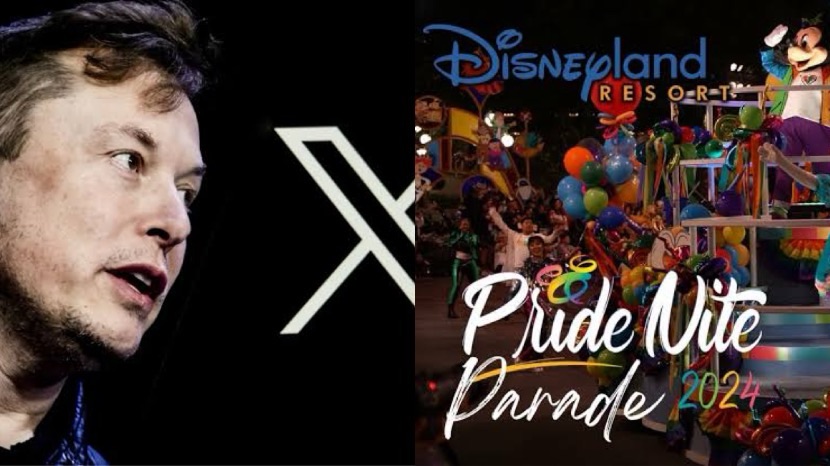NEWS
Elon Musk Blocks Disney’s LGBTQ+ Pride Posts on X, Claims ‘Woke’ Content Should Be Kept Away from Kids

Elon Musk Blocks Disney’s Pride Content on X, Declares ‘Woke’ Isn’t for Kids
Elon Musk, the billionaire entrepreneur and owner of X (formerly Twitter), has once again made headlines with a bold move that has sparked debate across social media platforms. In a recent series of actions, Musk blocked Disney’s Pride-related content on X, commenting that “woke” ideologies have no place in children’s media. The decision has quickly garnered widespread attention, with many users divided over Musk’s stance on LGBTQ+ content and children’s programming.

The Controversial Block
The situation unfolded after Disney shared a series of posts celebrating Pride Month on X, featuring LGBTQ+ advocacy and related content aimed at promoting inclusivity and diversity. These posts were part of Disney’s broader initiative to showcase its commitment to the LGBTQ+ community through various media, including films, TV shows, and theme park events.
However, Musk, who acquired X in 2022 and has since implemented sweeping changes to the platform, took swift action by blocking or restricting visibility on the content. Musk commented on the situation, stating, “Woke is not for kids,” expressing his belief that certain ideological content shouldn’t be part of entertainment geared towards younger audiences.
Musk’s action quickly sparked a heated debate online. Critics of his move argue that diversity, inclusivity, and LGBTQ+ representation are crucial elements of modern media and should be accessible to all audiences, including children. Proponents of Musk’s view, on the other hand, argue that children’s content should be focused on entertainment and traditional values, rather than promoting political or ideological messages.
Musk’s ‘Woke’ Critique
Elon Musk’s comments about “woke” content have been a central theme in his public persona since taking control of X. The term “woke” has become a divisive catchphrase, often used to describe a heightened awareness of social justice issues, such as race, gender, and LGBTQ+ rights. Critics of “woke culture” argue that it’s become overly politicized, while supporters contend that it represents an essential movement toward equality and inclusion.
In a recent tweet, Musk wrote, “Kids don’t need to be exposed to ‘woke’ messaging. Entertainment should be about fun and creativity, not ideological indoctrination.” Musk’s position appears to reflect his broader philosophy that content, especially content aimed at younger audiences, should prioritize entertainment over activism.
Musk’s comments echo a growing sentiment among some conservative groups who have raised concerns about what they view as the over-politicization of children’s programming. This includes debates over the inclusion of LGBTQ+ characters in animated films, the portrayal of diverse family structures, and the increasing focus on social issues within children’s content.
Disney’s Commitment to Diversity
For Disney, the suspension of its Pride content on X marks another point of contention in an ongoing cultural battle. The entertainment giant has long been a vocal advocate for LGBTQ+ rights, and its recent initiatives have included a push for greater representation in its films, TV shows, and parks. Disney has also become a target of right-wing criticism in recent years, with some vocal detractors accusing the company of pushing a progressive agenda in its entertainment.
Disney’s Pride content on X has been part of its broader strategy to connect with audiences who value inclusivity and equality, especially in light of the growing demand for diverse and authentic representations in media. Recent Disney films like Lightyear, which featured a same-sex kiss, and The Owl House, which included LGBTQ+ storylines, have been praised by many for breaking new ground in children’s and family-friendly content.
In response to Musk’s move to block its Pride posts, Disney has yet to comment publicly, but the incident has only added fuel to the fire of ongoing culture wars surrounding corporate involvement in social justice issues.
Public Reaction: Divided Opinions
As expected, Musk’s decision has triggered intense reactions on both sides of the political spectrum. Some users on X supported Musk’s decision, arguing that children’s content should remain free of political messaging. “Woke culture has gone too far. Children’s media should focus on fun, not pushing political agendas,” one user commented in support of Musk.
Others, however, strongly criticized Musk’s move, calling it an infringement on artistic freedom and diversity. “LGBTQ+ kids deserve to see themselves represented in the media. Blocking Disney’s Pride content is an attack on inclusivity,” one user tweeted. “Representation matters, especially for young people figuring out their identity.”
The controversy also reignited discussions about the role of tech companies and platform owners in regulating content, particularly when it comes to issues of representation and freedom of speech. While Musk has positioned himself as a free speech advocate, his actions on X regarding Disney’s content have led some to question whether his vision of “free speech” aligns with the values of inclusivity and diversity embraced by many in the entertainment industry.
A Larger Conversation on ‘Woke’ Culture
This incident with Disney’s Pride content is just the latest in a series of moves by Musk that have sparked conversation around the role of “woke” culture in entertainment. His remarks and actions reflect the larger cultural divide that has taken root in recent years, with various factions arguing over what is appropriate in children’s programming, how companies should engage with social issues, and whether or not certain political ideologies have a place in family entertainment.
For Musk, blocking Disney’s Pride content on X signals that his stance on these issues is unlikely to change anytime soon. He continues to challenge the growing influence of “woke” culture in mainstream media and tech, especially when it comes to children’s content. However, the backlash he’s facing suggests that his approach to content moderation on X may alienate some of the platform’s users, particularly those who advocate for broader representation and inclusivity.
The Bigger Picture
Musk’s decision to block Disney’s Pride content is part of a broader shift in how entertainment and social media platforms are navigating the growing cultural divide over issues like diversity, gender












